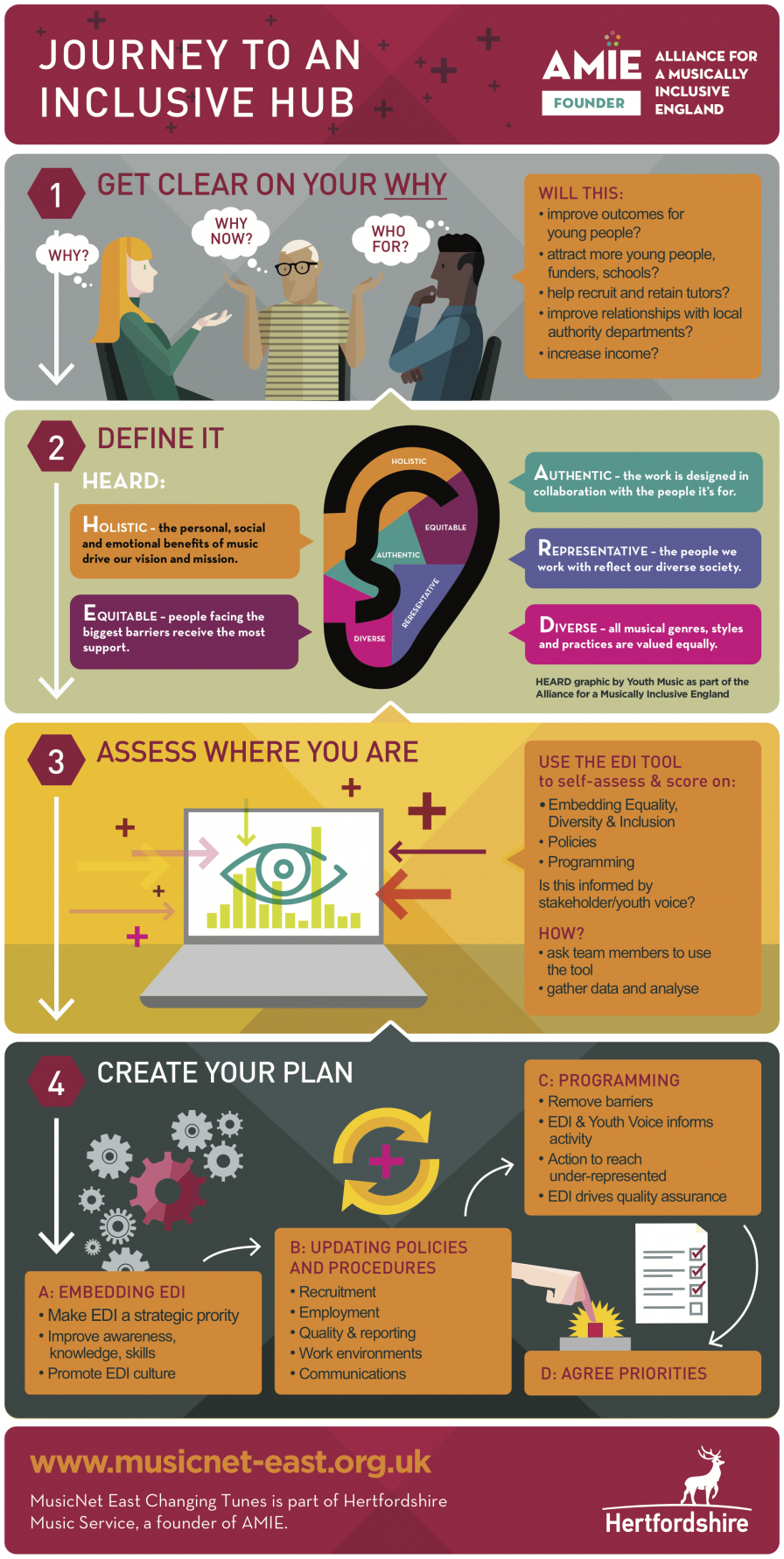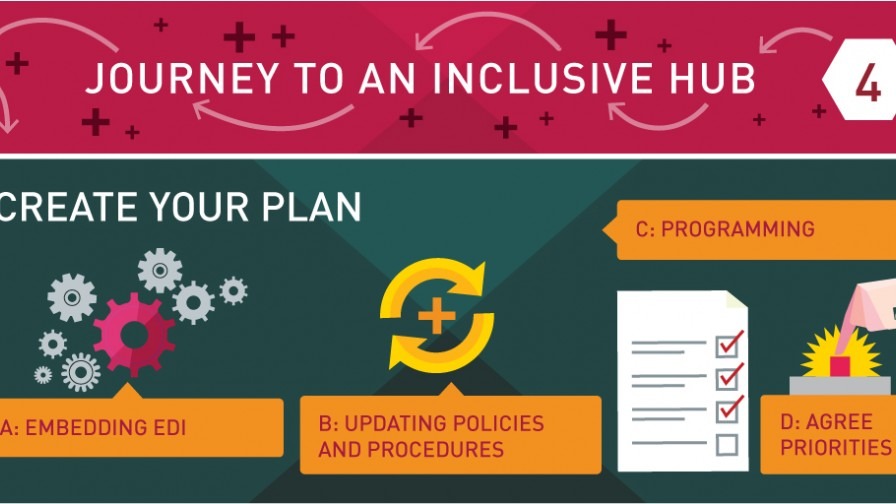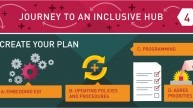How we used Equality, Diversity and Inclusion planning to create our 10-year vision

We all want our work to be accessible and relevant to as many people as possible. Most music services have staff who are eager to be inclusive and could do a lot to drive things forward, from the tutors to the finance manager. But actually embedding equality, diversity and inclusion in our work can seem easier said than done. Nick Denham, Head of Inclusion explains how Hertfordshire Music Service are making inclusion the focus of their ten-year business vision. Find out how you can get involved at the end of this blog.
Equality, diversity and inclusion is becoming a critical part of the work of all cultural organisations. It’s no longer an add-on to our work. It’s now central to our ability to be valued and relevant to our participants, funders and other stakeholders. And just as importantly, it’s integral to creative diversity and innovation. But what does this mean in the real world, for music services facing competing demands for their time and money?
Until we started to use Youth Music’s Equality, Diversity and Inclusion (EDI) tool, our inclusion focus tended to be around programmes of work targeted to young people facing barriers in their lives. We have a Rock, Pop and Families lead, who is from a community music background, and a small team of tutors with a similar focus, ie valuing social and personal outcomes alongside musical ones. They had successfully developed work in schools and other settings, as well as out of school activities.
Growing need and relevance
The work was growing. Local authority commissioners, schools, and others were recognising that music could play an important role in their work. It was becoming valued equally as a tool for engagement and outcomes, as well as a curriculum entitlement for their young people.
Another set of circumstances also drove our decision. The local authority had asked us to carry out a transformation programme, exploring ways we could become a ‘cost neutral’ service. This included options for delivering the service within and outside the Council. At the same time, a new Executive Leadership Team was being put in place.
So, knowing that there was a business case, as well as a social justice reason, to prioritise inclusion, we decided to use the EDI tool and framework to help us review all areas of our service.
We recognise we’re fortunate. We’re a large music service, and we’ve received Youth Music funding for inclusion work for some years now. Added to this, we now receive a ‘Fund C’ grant, which requires us to look at how inclusion can inform the whole of our organisation, and to support other music services to do the same.
Not every music service will have had those opportunities. But we believe that the EDI tool can help any music service, no matter what size, or the communities you serve.
Inclusion isn’t just about programmes – and people may not call it ‘inclusion’
One of the first things the EDI process highlighted for us, was that there were pockets of good inclusion work, in different locations, and outside of the targeted programmes. These were often driven by people’s own passions and local knowledge of needs and barriers – and they weren’t necessarily calling it ‘inclusion’.
For example, tutors who asked about a students’ musical interests, began each lesson by noticing how the young person was in themselves and adapted the lesson accordingly. Some had even talked to the SEN lead in a school to find out a bit more about particular young people’s challenges. This is sure to be the case in any music service.
So EDI planning helped us to identify great inclusion work that was going on below the radar, as well as people who were passionate about specific areas of work. It helped us to get to know our teachers, and begin to recognise, learn from this good practice, and plan ways to scale it up.
Inclusion requires us to do deep thinking about what’s working, and what isn’t
It also helped us to identify areas of our business that were showing both a weakness and an opportunity. For example, we found out that some members of staff were going above and beyond what was required in the standard week’s induction for new members of staff. They knew it made a difference to the team, and to young people’s experience of our service. This prompted a discussion and a set of actions as part of our business planning process.
Some members of the team asked how we could make sure that parents and students were aware of the wider benefits of music, beyond technical musical ability. One very quick win was to add a question about personal and social outcomes into our student report. You can download our sample form & notes for tutors here.
There are small steps that everyone can take that will make a difference.
One of the resounding takeaways from the process was that embedding inclusion in our organisation has started to improve it. We want teachers feel supported, and that they have a voice – as well as young people. It’s energising us as a team and as individuals, and is giving us a greater sense of mission, vision and values. But it’s not easy. Everyone has had to look really hard at the organisation and their work within it, constantly challenging themselves to do better.
Taking this approach to other music services
We’re part of the Alliance for a Musically Inclusive England, and as part of this, and our Youth Music-funded Changing Tunes programme, we run the National Music Services Working Group for Inclusion (NWG), in partnership with Music Mark, the association for music education. The NWG consists of currently 11 music services who are supporting each other, and having support from us and Music Mark, to develop their inclusion approaches. We do this through meetings of this peer network, resources and tools, as well as allocating funding for action research into the drivers and barriers of inclusion within music services. Information from the NWG and MusicNet East is shared to all Music Services through Music Mark’s communications.
We’ve asked all members to complete the same process as we did, using the same tool, and to share their completed checklist with us (confidentially) so that we can identify common themes, and look at how we can support people in these areas. In fact, any music service in England who completes an EDI action plan and shares it with us, can join the group. So if you’re reading this and interested to try it in your organisation, do let us know how you get on, and see below for how you can get further support.
Hertfordshire Music Service is a founder member of the Alliance for a Musically Inclusive England (AMIE). Its MusicNet East – Changing Tunes programme helps music services to become more inclusive by providing a peer network, resources and tools, and funding for action research on the barriers and drivers to inclusion. Visit the AMIE Musical Inclusion Resource Hub for tools and guidance, blogs, videos, case studies and more, to help you break down barriers to music-making.
Are you a music service interested in driving organisational change through inclusion?
- TOOL: Find out about and download the Youth Music Equality, Diversity and Inclusion tool
- EXAMPLE: See the inclusion statement that introduces our EDI action plan
- RESOURCE: Student report form (instrumental/vocal tuition) & notes for tutors
- BLOG: How to use Youth Music's Equality, Diversity and Inclusion tool for action planning - a view from Hertfordshire Music Service
- BLOG: The business case for inclusion
- Find out about funding for action research, resources and information about music services and inclusion: sign up for the MusicNet East enews – particularly if you’re interested in funding for action research and follow @MusicNetEast on Twitter



